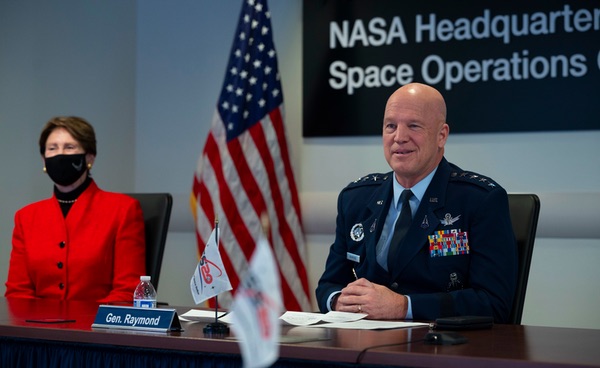What will space security look like in 2021?by Nayef Al-Rodhan
|
| The ISS has traditionally been a diplomatic and scientific center rather than a military one, and some may well see the commissioning of a Space Force office there as American militarization of a neutral domain. |
While this is still far behind the 1,425 active American satellites (as of mid-2020), Chinese space assets are becoming significantly more sophisticated and the Chinese government is likely to consider measures to protect them. Japan’s National Institute for Defense Studies recently published a report suggesting that the Chinese military intends to match US capabilities in outer space and is investing heavily in artificial intelligence and other cutting-edge technologies to make this a reality. Last year, the country completed its own space navigation system, Beidou, ensuring it will no longer need to rely on the US government’s Global Positioning System (GPS). These efforts will only continue in 2021, and it is therefore likely that with the growth in space assets, China will look to have a stronger military presence in outer space.
Russia
Russia sits as the third-largest owner of space assets, with just over 170 satellites in outer space. Despite this, it has actively prioritized space investment and space militarization. It also has a long history of very sophisticated launch and other space technology capabilities. It has technological capabilities to disrupt communications and reconnaissance satellites on the ground and may develop similar capabilities from space.
In October 2020, it launched another navigation satellite, joining the 24 active spacecraft which are part of its GLONASS fleet, which is run by its Ministry of Defense. The fleet is Russia’s equivalent to the US’ GPS and the EU’s Galileo satellite systems, which is accessible by both civilian and military branches of government.
US allies
Both the Macron and Johnson governments have made space a priority. Last January, the British government appointed Air Vice Marshal Harvey Smyth to a new “Space Command” as well as creating a cabinet-level national space council. Johnson’s government has also pursued investment in new satellite technologies and space defense assets. The French have also set up their own space force, in part as a response to the US Space Force.
| Rashly amassing military measures in outer space to make space safe for one state may end up making space safe for no one. |
While more than half of outer space assets are owned by NATO members, NATO itself does not own any assets. However, last year NATO Secretary General Jens Stoltenberg did note that the organization recognized outer space as one of the new military domains and, in October 2020, the creation of a new NATO Space Command based in Germany was announced, in part as a reaction to the efforts of Russia and China. Stoltenberg announced that “This [center] will be a focal point for ensuring space support to NATO operations, sharing information, and coordinating our activities.”
The way forward
Given these developments, it is highly likely the US Space Force will become a significant part of current and future geopolitical efforts. However, even though it is regrettably clear that outer space has become a military domain for the world’s major powers, it is vital that it is approached delicately and cooperatively. Rather than turning the amassing of new offensive space assets, and the means to protect them, into a space race, nations have to think about their own collective security.
Outer space remains a contested and unregulated domain of activity and militarizing activity there will, in the long term, make space a geopolitical Wild West if international organizations fail to establish clear treaties that limit action. Every state is in a symbiotic relationship with the other, and rashly amassing military measures in outer space to make space safe for one state may end up making space safe for no one. In 2021, every government should consider their actions wisely, and cooperate rather than make space activity a dangerous game of competition.
I have often suggested that given humanity's increasing and irreversible dependence on outer space for daily human needs, space will either be safe for all or for none. In the absence of enforceable regulatory frameworks, a potential cascading space conflict (intentional or unintentional) remains a significant frontier risk for humanity.
Note: we are temporarily moderating all comments submitted to deal with a surge in spam.
